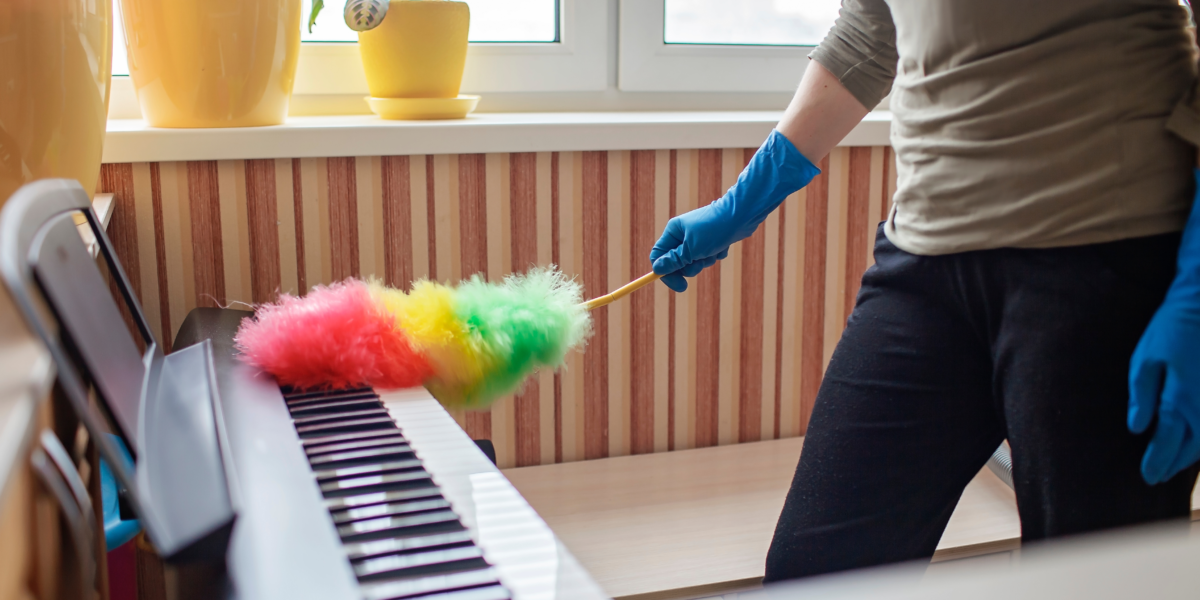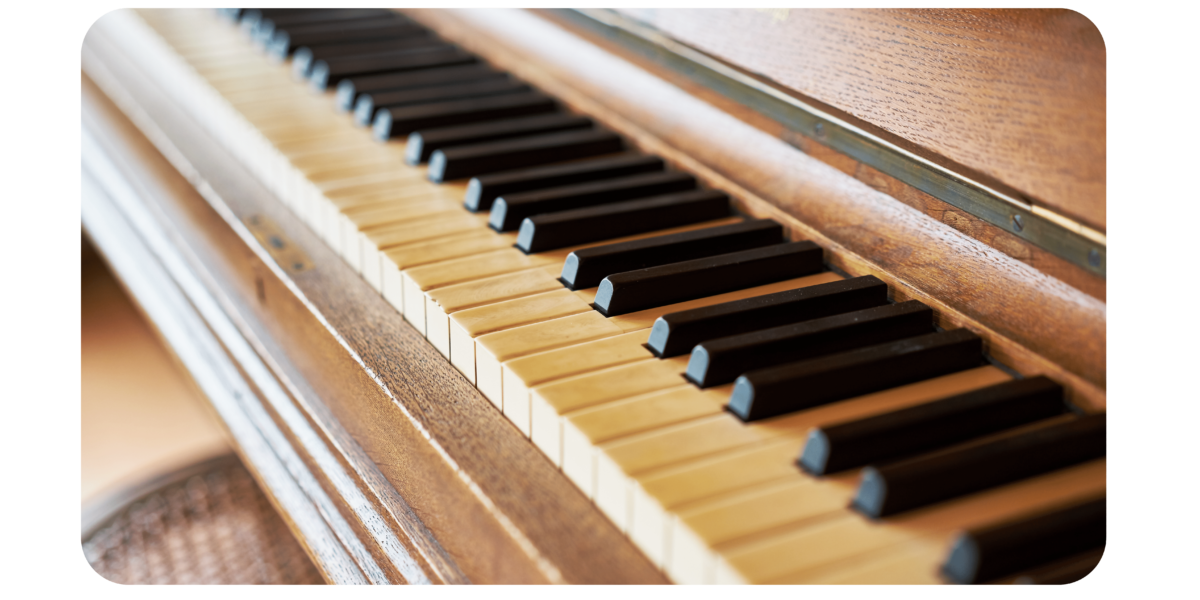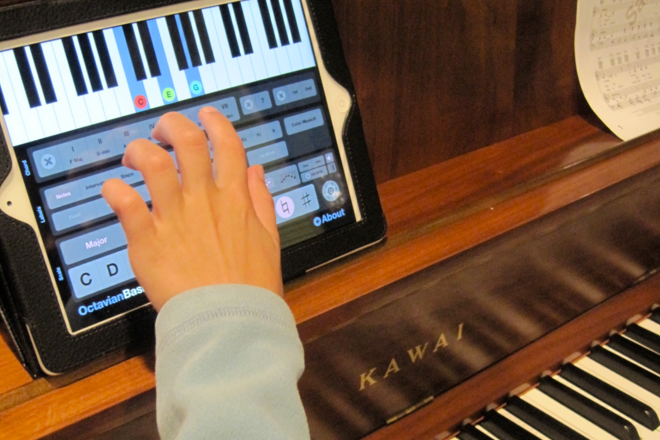How to Clean Piano Keys in The Right Way

In this article, you will learn everything there is to know about cleaning different types of piano keys and how to keep them clean for longer.
You may play an antique piano, or perhaps you just bought a new piano last year. Either way, when you sit down for regular practice sessions, you want your instrument to be clean. It’s easy to dust the top off, but how do you safely clean the piano keys?
Cleaning piano keys can be a tricky business.
We’ll give you the best tips on cleaning your piano, whether you have old ivory keys or modern plastic ones.
General tips for cleaning piano keys.
Are you ready to clean your piano keys? There are a few general cleaning tips that apply to both ivory and plastic keys.
1. Use only lightly damp cloths to clean your keys. Too much moisture can damage your instrument. Always wipe the keys with a dry cloth after you finish cleaning them.
2. Wipe keys in a top to bottom motion. Don’t wipe them from side to side, as this can cause the keys to become loose and wiggle.
3. Avoid using paper towels and colored cloths. Instead, soft, white cloth is the best choice. Use one cloth for the white keys and a separate one for the black. Sometimes the black stain may rub off. You don’t want the surprise of black streaks on your white keys.
When cleaning piano keys, make sure not to leave any residue, polish, oils, or chemicals behind. Ivory keys are irreplaceable, and even plastic keys are sensitive to harsh chemicals.
What kind of piano keys do you have?
Before you start cleaning, check the material of your piano keys. Most modern keys are plastic, while many antique pianos have true ivory keys.
Yamaha and other piano brands currently manufacture plastic keys with ivory looks and feel. This plastic-based material is called synthetic ivory, simulated ivory, and ivorite, among other names.
So, how do you decipher whether your keys are plastic or ivory?
In the 1950s, laws were established to protect elephants, and plastic piano keys started a trend. Then, in 1989, ivory was banned altogether.
So if your piano is older than 1950, it likely has ivory keys. However, if it is newer than 1990, it’s safe to say the piano keys are a plastic material.
If you have an old piano, there are a few ways to determine whether your keys are ivory.
- You may notice a texture when you touch the keys.
- Ivory is porous, so it yellows and stains easier than plastic.
- While plastic keys are made from a mold, ivory piano keys are often pieced together. You can usually find seam lines in the ivory veneer.
- Using a magnifying glass, you can see a grain similar to a fingerprint on ivory keys.
- Under a blacklight, ivory will glow white or blue.
After you determine what type of material your piano keys are, you can choose the right type of material to clean them. Now, let’s clean up those keys and make them shine.
How to clean ivory keys.
After you deduce that your piano keys are ivory, you want to choose the best cleaning products for the job.
A lightly damp cloth with a mild soap works best if your keys are dusty. Wipe vertically until clean.
However, ivory keys tend to yellow over time and stain easily from finger oils. Many look at this yellow patina as desirable and say it adds to the value of the ivory. If it bothers you, there are some ways to whiten the keys.

One of the most gentle ways to whiten ivory keys is to buff the surface with mild toothpaste on a cloth. This may seem like a curious cleaning product to use. However, ivory is a type of tooth material when you think about it.
Try it out on one key to ensure you get the desired effect. Then take it slowly from key to key. Less is more when you use toothpaste on keys. You don’t want to get toothpaste in the cracks, or you may have more to clean.
When you finish, wipe the keys with a damp cloth and then a dry one. A layer of grime is now history.
How to clean and disinfect plastic piano keys.
Plastic keys may seem like the more resistant key type. You are less likely to get cracks in the veneer, and they tend to stay whiter than ivory keys. However, you still don’t want to use tough cleaning products, or you can melt the plastic coating off the keys.
Steinway and other piano experts recommend using hydrogen peroxide to clean plastic piano keys.
Add a few drops of hydrogen peroxide to a soft, damp cloth. (Never pour or spray a cleaner directly on the keys.) Then, wipe each key in a vertical motion.
Hydrogen peroxide is easy to find over the counter at any pharmacy. It can both disinfect the keys and remove oil stains. This product is also safe for the finish of most piano keys.
Dos and don’ts for piano cleaning.
Here are a few key points to remember when you go to clean your piano keys:
- Don’t use colored cloths to clean as the color may rub off on your keys.
- Do use a white, lint-free cloth.
- Don’t use any type of solvent to clean your keys. Harsh cleaning products can damage the finish of your keys.
- Do test your cleaning product on a small area of a key before trying it out on all the keys.
- Don’t spray the piano keys directly with any cleaning materials. Instead, spray a cloth.
- Do use a different cloth for black keys and white keys.
- Don’t use bleach-based products to clean your keys.
- Do dilute alcohol-based products before you use them to clean your keys.
- Don’t use lemon juice or other citrus products on the keys.
- Do wipe down keys with a dry cloth after cleaning to ensure no moisture remains.
- Don’t use canned air to dust the keys. This can damage sensitive mechanisms in your piano.
Now that the keys are clean, how do you keep them that way?
Since you probably won’t be wiping your piano keys with toothpaste or hydrogen peroxide every day (nor should you), what is the best way to maintain clean keys?
How often you should wipe down your piano depends on how often the piano is used. Wiping down the piano two to three times a week should be enough for a home piano that gets regular use.
This keeps dust from building up in your piano and helps to preserve its sound quality. It also removes finger oils that can stain the keys over time.
When you finish a practice session, close the lid of the piano. This is extra protection to keep your keys clean.
If you share a practice room with many other musicians, you may want to clean the keys each time you sit at the piano. Simple disinfectant wipes can clean the surface without damaging the keys. These are also easy to take with you.
You’ve got clean keys. Now it’s time to play.
Nothing beats the feel of freshly cleaned piano keys. Also, if you want to Label Piano Keys for Beginners, right after a good cleaning is a good time.
Once you clean, disinfect, and possibly label your piano keys, it’s time to play the piano. For extra input on your piano skills, try out the Simply Piano app. This app gives you feedback in real-time, so your fingers stay on the right keys.









